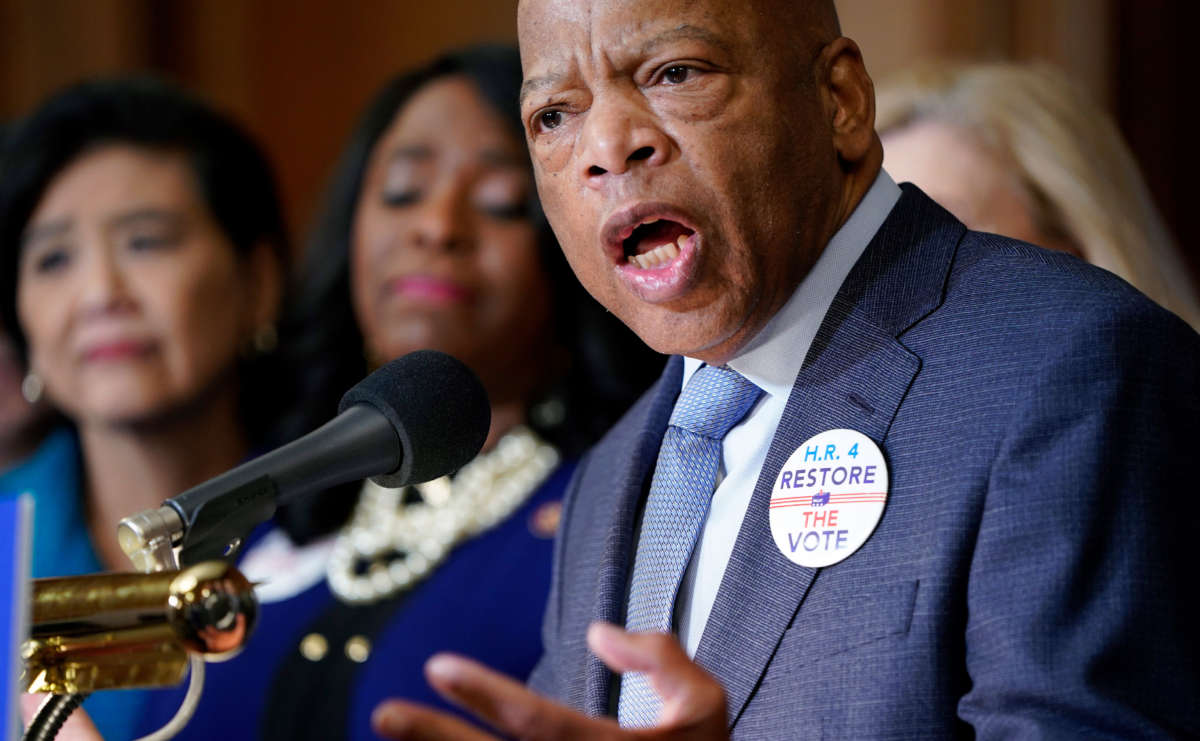Support justice-driven, accurate and transparent news — make a quick donation to Truthout today!
Democratic lawmakers in Congress are calling on Senate Majority Leader Mitch McConnell to end his years-long obstruction of a bill that would restore the Voting Rights Act, a push that those in favor of the bill say would honor the late Civil Rights icon Rep. John Lewis, who passed away on Friday at age 80.
Some also suggested that the bill be renamed after Lewis.
“John Lewis risked his life for the right to vote. Truly honoring his legacy means passing the Voting Rights Act,” Sen. Sheldon Whitehouse (D-Rhode Island) wrote on Twitter.
Sen. Patrick Leahy (D-Vermont) also called for the bill to be allowed on the Senate floor.
“As author and chief sponsor of the Senate bill I will be reintroducing #VRAA this week, naming it for John Lewis, my longtime partner on this,” he tweeted out.
“To honor John Lewis’ life and legacy, I’m calling on Mitch McConnell to immediately bring the Voting Rights Advancement Act to the Senate floor for a vote and the Senate should name it the John Lewis Voting Rights Act of 2020,” Sen. Kamala Harris (D-California) said.
House Majority Whip Rep. John Clyburn (D-South Carolina) also called for the bill to be allowed on the floor for a vote. And speaking on CNN’s “State of the Union” program on Sunday, Clyburn voiced his support for the bill to be renamed in honor of his late colleague.
“It should be the John R. Lewis Voting Rights Act of 2020. That’s the way to do it,” he said. “Words may be powerful, but deeds are lasting.”
Lewis was among the leaders who led a march over the Edmund Pettus Bridge in Selma, Alabama, in 1965. The march was meant to draw attention to the need to protect voting rights of Black Americans. State troopers attacked demonstrators at the protest, with Lewis himself receiving a cracked skull from a trooper who hit him to the ground with a nightstick. The Civil Rights hero has returned to the site annually in remembrance of what happened there in 1965.
On NBC’s “Meet the Press,” Clyburn also called for the bridge to be renamed in Lewis’s honor.
“Edmund Pettus was a grand wizard of the Ku Klux Klan. Take his name off that bridge and replace it with a good man, John Lewis, the personification of the goodness of America, rather than to honor someone who disrespected individual freedoms,” Clyburn said.
The Voting Rights Act of 1965 was a law intended to block state efforts at implementing discriminatory voting practices that limited the rights of Black voters to take part in democratic elections. Federal officials were also dispatched to states where intimidation or other attempts to limit voting were the norm.
In 2013, the Supreme Court ruled that key aspects of the act were not needed any longer. Critics of that ruling noted, however, that successes observed by the conservative justices were happening precisely because the law was working.
Tossing those aspects of the law aside when they had worked as they were intended to was “like throwing away your umbrella in a rainstorm because you are not getting wet,” dissenting Justice Ruth Bader Ginsburg noted.
Since the law was blocked, efforts in Congress to restore the Voting Rights Act have stalled, with McConnell being one of the main obstacles to its passage. In 2019, after the Democratic-led House passed a bill that would restore the act, McConnell refused to even allow the bill to reach the Senate floor, saying at the time that he gets “to decide what we vote on.”
“What is the problem we’re trying to solve here? People are flooding to the polls,” he added, defending his decision to block its passage.
Yet, there are a number of examples where the bill could have worked to stop discriminatory actions in voting, including possibly preventing the closing of polling places in precincts where a majority of voters are Black, and restricting racist gerrymandered maps or voter ID laws that have been passed by state governments since the Supreme Court’s decision was rendered.
In 2013, Lewis himself opined on the Court’s decision to gut the law. “Those justices were never beaten or jailed for trying to register to vote,” he wrote. “They have no friends who gave their lives for the right to vote. I want to say to them, ‘Come and walk in my shoes.'”
A terrifying moment. We appeal for your support.
In the last weeks, we have witnessed an authoritarian assault on communities in Minnesota and across the nation.
The need for truthful, grassroots reporting is urgent at this cataclysmic historical moment. Yet, Trump-aligned billionaires and other allies have taken over many legacy media outlets — the culmination of a decades-long campaign to place control of the narrative into the hands of the political right.
We refuse to let Trump’s blatant propaganda machine go unchecked. Untethered to corporate ownership or advertisers, Truthout remains fearless in our reporting and our determination to use journalism as a tool for justice.
But we need your help just to fund our basic expenses. Over 80 percent of Truthout’s funding comes from small individual donations from our community of readers, and over a third of our total budget is supported by recurring monthly donors.
Truthout has launched a fundraiser to add 432 new monthly donors in the next 7 days. Whether you can make a small monthly donation or a larger one-time gift, Truthout only works with your support.
